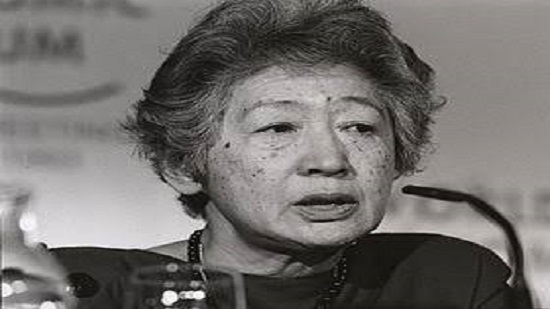Japan and the world as a whole recently lost a prominent Japanese woman who had had a national and global impact for over five decades in the person of the late Dr Sadako Ogata who has passed away at the age of 92. I had the great privilege of getting to know Ogata personally and working closely with her both in Geneva when she was serving as the UN High Commissioner for Refugees (UNHCR) as well as in Tokyo when she was serving as the president of the Japan International Cooperation Agency (JICA).
A Japanese woman with global impact
by Al Ahram
Opinion
00:01
Monday ,20 January 2020

Ogata has left behind her a lasting legacy on both the domestic Japanese scene as well as on a world scale. This was a result of her outstanding achievements in all the posts she served in throughout her long academic and professional life. She played an instrumental role in a critical period of world history and more specifically in post-Cold War affairs in an era characterised by unprecedented tragedies since the establishment of the post-World War II world order.
Not only did she serve as UN High Commissioner for Refugees for a decade, but she also served at a later stage for almost the same period as the president of the JICA. In her later years, she was a senior adviser to the JICA and a member of the advisory board for the organisation of the 2020 Tokyo Olympics.
The links between Ogata and the public life of her country started early, as her grandfather had been a prime minister of Japan. She was the daughter of a Japanese diplomat, and the fact that she moved with her family to different countries throughout her childhood exposed her to different cultures and civilisations from an early age, enriching her perspectives and broadening her horizons for the rest of her life.
Her academic career was equally cosmopolitan and distinguished. After receiving her BA from the Sacred University in the Japanese capital Tokyo, she pursued her graduate studies at Georgetown University in Washington DC. She later received a PhD in political science from the University of California. Soon afterwards, she became an associate professor at the Christian University in Tokyo and then a full professor at Sophia University, also in Tokyo. Her stay at Sophia University proved to be long-lasting and increasingly substantial, and she later chaired the International Relations Institute at the university and in 1989 became dean of foreign studies, becoming the first person in Japan to introduce a “model UN” to an academic institution.
Her long career in international diplomacy also started early, and in 1968 she was invited to join the Japanese delegation to that year s session of the UN General Assembly. In 1976, she was the first woman to serve at the level of minister plenipotentiary at the Japanese Permanent Mission to the UN in New York. Between 1982 and 1985, she represented Japan on the UN Committee for Human Rights, which later became the UN Human Rights Council.
Between 1991 and 2000, Ogata served as UN High Commissioner for Refugees for two terms. Not only was she the first Japanese national to assume the post, but she was also the first woman and the first academic to hold it. In this capacity, she had to deal with multiple crises and conflicts, particularly of an ethnic and sectarian nature, in different areas of the world. The most serious were those related to the wars in Bosnia Herzegovina, the Great Lakes region of Africa (Rwanda and Burundi), and the Gulf region in the aftermath of the Iraqi invasion of Kuwait.
All these conflicts resulted in the outflow of refugees and miserable living conditions that threatened the lives of millions. Ogata demonstrated exemplary leadership qualities in handling these critical and dramatic human crises. She was keen to travel to the areas in person in order to show her engagement and dedication to helping the refugees. She became so popular that many refugees named their daughters after her.
After completing her two mandates at the UNHCR, and prior to being appointed as the president of the JICA in 2003, Ogata served as special envoy of the Japanese prime minister for coordinating Japanese aid in the reconstruction of Afghanistan following the fall of Taliban rule in late 2001.
In her capacity as president of the JICA until 2012, she showed her support for Egyptian efforts to promote economic, social and cultural development. This was particularly demonstrated through the vital role she played in ensuring Japanese approval for the Egypt-Japan University for Science and Technology (E-JUST), inaugurated in 2010, and the Grand Egyptian Museum (GEM), scheduled to be inaugurated soon.
In addition, she supported many other projects that were taking place in partnership with Egypt, including new and renewable energy projects, particularly in wind energy and solar energy, and projects aimed at improving the living conditions of the lower socio-economic strata, such as improving sewerage and water systems, particularly in rural areas, and the treatment and management of waste.
There is no doubt that Ogata will always serve as a model for all those committed to public service, particularly at the international level, as well as for Japanese women who have long been very proud of her and have sought to emulate her in their own lives or to bring up their daughters in her footsteps.
Sadako Ogata will be greatly missed, including among her many friends in Egypt.

